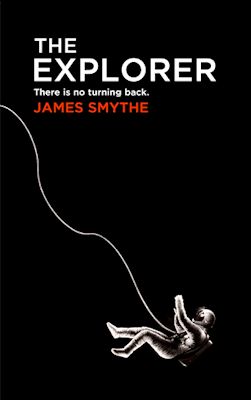Hot on the heels of the apocalyptic vision described in his debut, rising star James Smythe returns to genre fiction with a deliciously different book from his first. An introspective time travel novel from which you won’t be able to look away, The Explorer plays out like Moon meets Groundhog Day.
It’s “a pulpy, sci-fi thing about a man who is trapped in a perpetual loop, a time loop, like so many other sci-fi stories wrenched from the back of magazines—there are no original ideas, not any more—but this one is more human, or trying to be.” In this, it succeeds indeed. The various incarnations of Cormac Easton alternate between ecstatic, distracted and tragic, meanwhile the other astronauts on the Ishiguro feel equally real.
Not that they live long enough to make much of an initial impression, because the author knocks the whole lot off in The Explorer’s opening chapter, in what would be a comedy of errors under other circumstances. And our understandably manic protagonist is next: Cormac himself dies soon afterwards, only to open his eyes…and surprise! The spaceship and its crew, including a visibly healthier version of himself, have been miraculously restored around him, as if none of the hell they went through—the very hell they’ll go through again unless our half-crazed narrator can change their fate—had happened.
We’re getting ahead of ourselves already, however this is suspiciously fitting—after all, the beginning of the end is the end of the beginning in Smythe’s superlative second novel, thus the short opening section of The Explorer is ingeniously designed to displace. But you must be wondering who the eponymous explorer is anyway, and what in the world he’s doing in space…so I’ll be kind, and rewind.
Not unlike his creator, Cormac Easton is a journalist. James Smythe still writes for The Guardian, contributing a regular Stephen King reread to rival Gracy Hendrix’s epic endeavour for Tor.com; The Explorer’s central character, on the other hand, publishes in Time Magazine and the like. He and the other souls aboard the ill-fated spaceship were selected in a competition of sorts, details of which the author trickles out throughout.
A quick word to the wise: read these flashbacks carefully, because there’s more to them—so much more—than meets the eye.
Anyway, in accordance with the Ishiguro’s continuing mission,Cormac gets to boldly go where no man has gone before— so long as he blogs about his experiences on a daily basis. Thus, he engages with the fiction of the explorer more than the actual fact. The “great deceit” of the spacefarer is a particularly striking instance of this:
“Astronauts were almost conceived by fiction, by books and television and movies, and then they became real, but those conceits created with the first image of a man travelling beyond the bounds of Earth, and heading towards the stars, those have stayed. The astronaut is alone. He drifts through space. He explores. He discovers. Since it all changed—since the India tragedy, the dearth of funding for governmental space agencies, the down-sizing of NASA—that was lost. Our purpose was to give that back. The people back home read my diary, a one-way transmission. We were like a television reality show, unaware of what was going on outside the TV studios; and then we made contact every few days, our faces beamed down to let them know that we were okay, that we were happy and doing our job, and exploring.”
The Explorer, then, is self-aware in all the right ways: not so much as to appear a postmodern parody, nor so little as to feel unbelievable. Somehow, Smythe’s second novel is both relevant and resonant in contemporary terms, such that it hardly seems like science fiction—though many of the genre’s traditional tropes are both present in the text and in full effect.
Still less likely, the premise feels fresh. Conceptually, of course, The Explorer has been done before, so its success rests on the author’s shoulders only. As he asserts in the acknowledgements—wherein hats are tipped to a telling list of genre fiction’s most influential figures, such as Stephen King, Philip K. Dick, George Orwell and Ray Bradbury—“story is the thing,” yet Smythe strikes an extraordinary balance between narrative and character. By pairing moments of pure exhilaration with excruciating emotion, he elevates events above and beyond the done-to-death loop at the core of The Explorer. Ultimately, Cormac’s quest is the exploration of himself as much as anything else.
That said, a few elements of the whole fall flat. Cormac insists on seeing his story as cinema—as a movie instead of a sincere experience—giving certain proceedings a sheen of the unreal, and Smythe’s prose is from time to time a touch verbose. In spots, The Explorer reads as raw and overwrought—by design, I dare say, considering the state and occupation of its central character… nevertheless, this decision detracts from the punch of some particularly pivotal points.
Otherwise, The Explorer is essentially exemplary: a short, sharp shock of a story from an author who deserves to do as well for himself as he does by us. It’s perfectly plotted, smartly characterised and rife with insight and excitement. Then again, when a book begins by killing off its entire cast, up to and including the person who narrates the remainder, you already know you’re in for something special, don’t you?
Make no mistake: this is that.
Niall Alexander is an erstwhile English teacher who reads and writes about all things weird and wonderful for The Speculative Scotsman, Strange Horizons and Tor.com. Sometimes he tweets about books, too.










